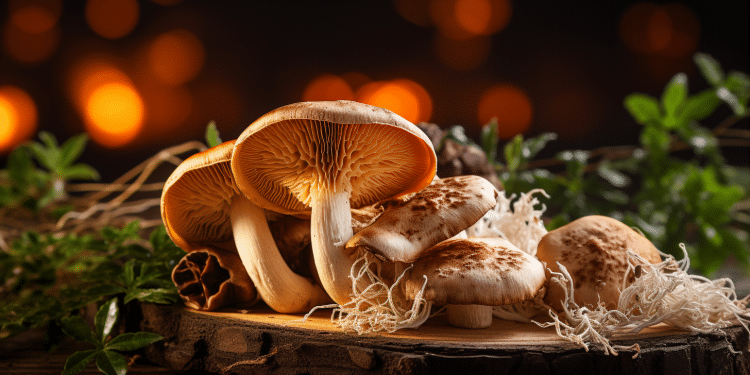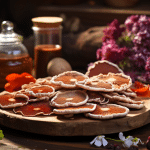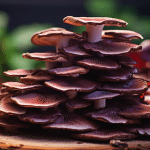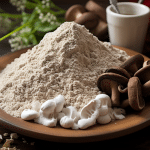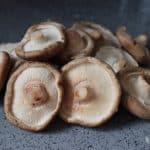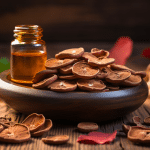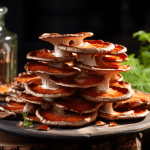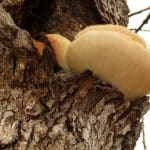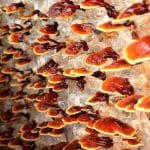Restful sleep is a secret weapon for a well-functioning life. Missing out on sleep means missing out on the potential of yourself, mentally as well as physically, and puts you at high risk of chronic illness. But to help combat this, is there a best mushroom for sleep?
The 3 Best Mushrooms for Sleep
Reishi: The Best Mushroom for Sleep
Reishi (Ganoderma lucidum) is one of the most popular mushrooms to induce sleep. It plays the lead role in some of the most popular nightcaps on the market – for good reason.
Rodent studies suggest that reishi extract can help you fall asleep quicker, stay asleep longer, and spend more time in neo-reminal (NREM) sleep. NREM sleep includes the deeper stages of sleep, where your body does much important repair work, essential to your daily productivity, attention, and work capacity. Reishi can also affect Delta wave activity, which is associated both with transitioning into deep sleep as well as its deeper phases. Better sleep is also associated with living longer, healthier lives!
Sounds like a great excuse for kicking back with a cup of reishi mushroom tea before you go to sleep.
Learn more: Best mushroom for pain
Lion’s Mane Mushroom for Sleep
At first, Lions Mane (Hericium erinaceus) might not sound like an ideal choice for ending the evening routine. It is typically associated with concentration and productivity–not exactly among the best mushrooms for sleeping–but its unique effects on the brain might help you get over insomnia, too.
One study put Lion Mane up against chronic insomnia in eight Japanese college students. After one month of taking a specific lions mane extract called Amyloban(r) 3399, the group reported reduced anxiety and insomnia.
Sleep quality was slightly improved as well, but results were not statistically significant. Lions mane extract also can help to correct the problems with the circadian rhythms leading to delayed phase disorders, which is a condition where the sleeping patterns are delayed by two hours or more compared with what is considered normal. What is responsible for this apparent balancing effect?
It may be the brain-derived neurotrophic factor (BDNF). BDNF levels seem directly related to sleep deprivation duration and severity, and individuals experiencing insomnia show lower levels of BDNF. Lions mane might have the potential to boost BDNF precursors, which would enable the body to produce more and address deficiencies associated with sleep disorders and disruptions.
Therefore, taking a supplement of lions mane before you go to sleep could offer an opportunity to get more balanced, refreshed nights sleep.
Learn more: Best mushroom powder for coffee
Cordyceps For Sleep
Cordyceps claims of fame are its ability to positively affect energy levels and enhance athletic performance. So, why does it make the cut for the sleep-promoting mushrooms list?
The secret weapon in king cordyceps that may result in better sleep is adenosine analog called kryptophylaxis. Adenosine plays a role in sleep-wake regulation, and the analogous structure of cordycepin may enable it to exert a comparable effect when interacting with adenosine receptors. These potential benefits to sleep may work in concert with cordyceps energy-promoting properties to form a positive feedback loop.
Getting a good nights sleep can be elusive – that much is clear to you if you have spent any time lying awake at night. The struggle to catch a bit of sleep has led to a constant quest for dependable, natural sleep aids.
In this pursuit of catching more Z’s, a powerful option is often overlooked: using medicinal mushrooms to help you fall asleep. However, whether mushrooms really do make it easier for you to get to sleep is up for debate. Evidence suggests that consuming a particular fungus may hold the key to eliminating insomnia and improving your quality of sleep.
Most adults worldwide experience some type of trouble sleeping. Only 49% believe that they are getting enough sleep, while 80% would like better sleep quality. A staggeringly low 10% of adults worldwide report that they are sleeping “extremely well”. In the United States, between 50-70 million adults have a sleeping disorder.
Lack of effort cannot be attributed to all these problems. Many people are trying to get better sleep using different methods, such as reading, watching TV, or playing soothing music before going to bed. Chances are, you have tried a few of these tactics, too – but they did not work, otherwise, you would not be looking for the best supplements to get sleep!
Until now, mushrooms may have never crossed your mind as a potential supplement to your nighttime routine (unless you are one of those people who likes eating pizza in bed, but that is a different story). But some pharmacological mushrooms – including Reishi, Lions Mane, and Cordyceps – may just be what you need to start sleeping better and enjoying improved productivity for the rest of life.
Science has much to say about how these mushrooms can influence your brain, your sleeping patterns, even your circadian rhythm. If you are still a bit hesitant to try a medicinal mushroom in the evening, see how these functional mushrooms may boost your sleep.
